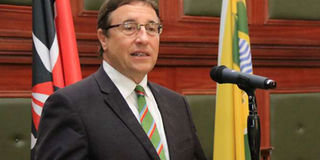Kenyan eco-friendly firms win awards

Unep Executive Director Achim Steiner addresses the media on May 18, 2016 when he paid a courtesy call to Nairobi Governor Evans Kidero. He has said that ecological business models have a huge role to play in achieving the Sustainable Development Goals. PHOTO | JEFF ANGOTE | NATION MEDIA GROUP
What you need to know:
- Horizon processes oil from seeds and leaves gathered by local groups that it then markets to the cosmetic industry.
- Slurry from the fibre-extraction process is given back to banana farmers for use as biogas.
NEW YORK
Three Kenyan start-ups are among the winners of United Nations-sponsored awards to green enterprises in Africa.
An international jury selected a total of 15 companies from a pool of more than 300 applicants for the Switch Africa Green-Seed awards conferred by a partnership of UN agencies and a global conservation group.
SEED WINNERS
The winners were announced on Thursday at a forum at UN headquarters in New York.
Each of the chosen enterprises will receive a bespoke support package intended to help scale up their operations.
“Ecological business models have a huge role to play in achieving the Sustainable Development Goals,” Achim Steiner, director of the UN Development Programme, said.
“We congratulate this year’s Seed winners for demonstrating that business really can be profitable whilst respecting nature and the environment.”
ANIMAL FEED
The Kenyan firms are Horizon Business Ventures, based in the Mount Kenya region; Kencoco, headquartered in Mombasa; and Icoseed, which operates in the eastern part of the country.
Horizon processes oil from seeds and leaves gathered by local groups that it then markets to the cosmetic industry in Kenya and abroad.
By-products are converted into animal feed and organic pesticides.
RECYCLING
Kencoco sells non-polluting cook stoves and produces charcoal briquettes from recycled agricultural coconut waste.
This form of charcoal provides a low-cost alternative to environmentally damaging fuels such as firewood, kerosene and wood charcoal.
Icoseed converts banana stems left over from harvests into fibres used for making bags, purses and table mats.
INNOVATION
Slurry from the fibre-extraction process is given back to banana farmers for use as biogas.
Three Ugandan businesses also won Seed awards.
Brent Technologies based in Masaka uses an innovative technology to transform waste motor oil into diesel fuel and asphalt roofing shingles.
GORILLAS
Gorilla Conservation Coffee aims to improve the livelihoods of coffee farmers and to protect mountain gorillas in Bwindi Impenetrable National Park.
It sells premium, branded roast coffee, with a purchase price that includes a donation to Conservation Through Public Health, a Uganda NGO.
Masupa Enterprises in Kagoma-Maganjo offers cheap and environmentally-friendly cooking material to urban and rural communities.
CLIMATE CHANGE
Its briquettes are made from dry leaves, paper, peels and other fruit and vegetable waste and are sold together with cook stoves to households and commercial customers.
All of this year's Seed award winners “stand as examples for other businesses that are striving to fight poverty and climate change in ways that are sustainable,” Mr Steiner said.





